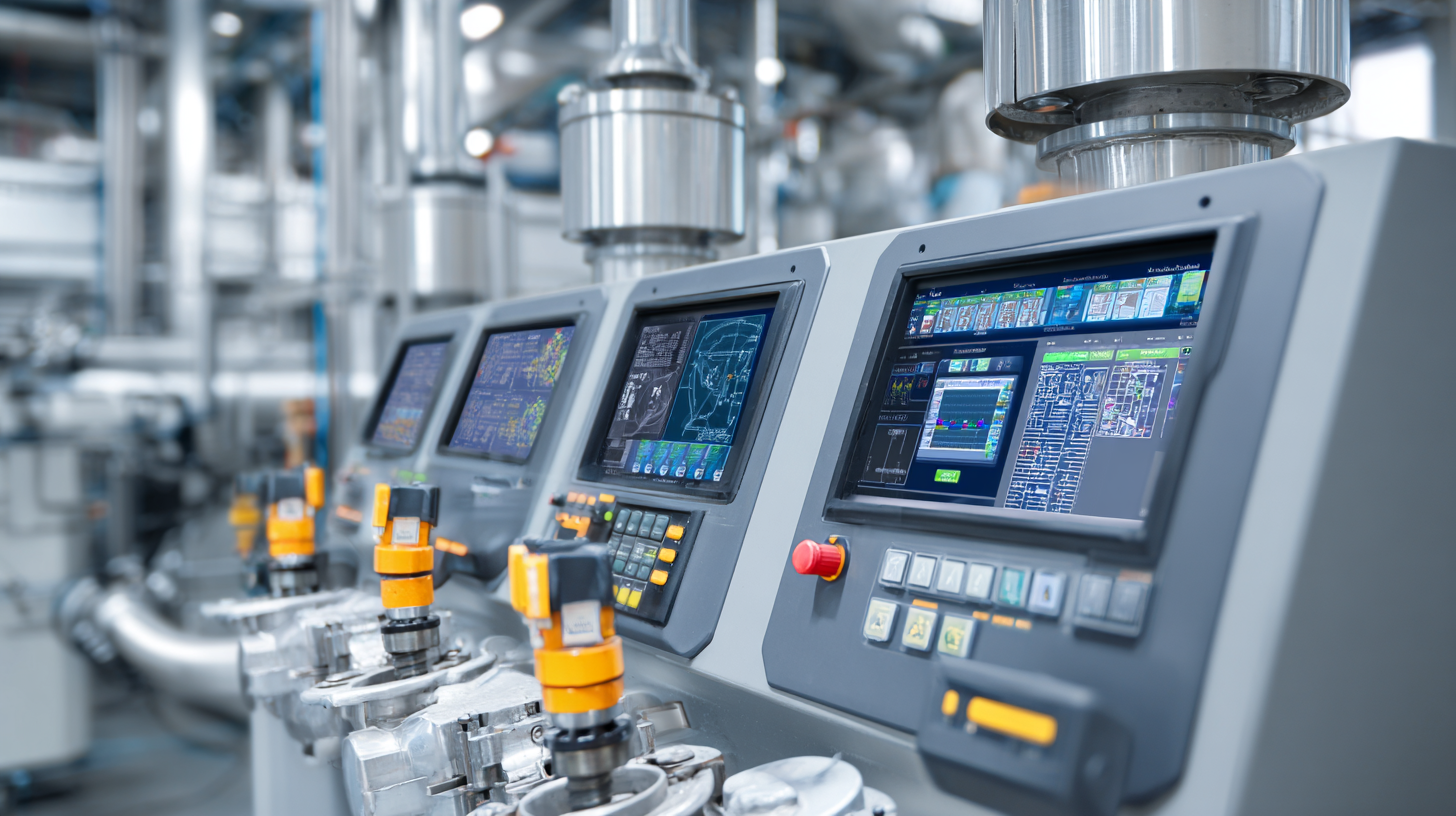As the manufacturing landscape evolves with the advent of Industry 4.0, the role of process control engineering becomes increasingly critical. In a recent report by MarketsandMarkets, the global smart manufacturing market is projected to reach USD 520 billion by 2025, underscoring the rising demand for advanced process control solutions. The integration of digital technologies, such as artificial intelligence and IoT, is revolutionizing traditional manufacturing processes, enabling real-time data analytics and automation. According to a study by McKinsey, companies that effectively employ process control engineering principles can improve operational efficiency by up to 30%, significantly enhancing productivity and quality. As manufacturers strive for greater agility and competitiveness, understanding the future of process control engineering will be essential for leveraging these digital advancements to achieve transformational outcomes in smart manufacturing.

 Process control engineering plays a pivotal role in enhancing the efficiency of smart manufacturing systems. By integrating advanced control strategies and real-time data analytics, process engineers can optimize production workflows and minimize waste. These sophisticated systems enable manufacturers to monitor processes with unparalleled precision, ensuring that every component operates at peak performance. The ability to swiftly adjust parameters in response to changing conditions not only increases productivity but also fosters a more sustainable manufacturing environment.
Process control engineering plays a pivotal role in enhancing the efficiency of smart manufacturing systems. By integrating advanced control strategies and real-time data analytics, process engineers can optimize production workflows and minimize waste. These sophisticated systems enable manufacturers to monitor processes with unparalleled precision, ensuring that every component operates at peak performance. The ability to swiftly adjust parameters in response to changing conditions not only increases productivity but also fosters a more sustainable manufacturing environment.
Moreover, the fusion of process control engineering with cutting-edge technologies such as IoT and machine learning significantly enhances decision-making processes. With an influx of data from various sources, process control systems can identify inefficiencies and predict maintenance needs, thus reducing downtime and operational costs. This proactive approach to process management not only elevates manufacturing capabilities but also positions businesses to swiftly adapt to market demands. As smart manufacturing continues to evolve, the strategic application of process control engineering will be essential for companies aiming to maintain competitiveness and drive innovation.
Emerging technologies are significantly transforming the landscape of process control engineering in smart manufacturing. According to a report by MarketsandMarkets, the global market for process automation and instrumentation is projected to reach $166.5 billion by 2027, growing at a CAGR of 6.9% from 2022. This growth reflects the increasing adoption of advanced technologies such as artificial intelligence (AI), the Internet of Things (IoT), and machine learning, which are enabling manufacturers to achieve higher efficiency, predictive maintenance, and superior product quality.
AI and machine learning algorithms are revolutionizing traditional process control methods by enabling real-time data analysis and decision-making. For instance, a study published in the Journal of Manufacturing Systems revealed that factories implementing AI-driven process analytics saw a reduction in production downtime by an average of 25%. Furthermore, IoT devices are enhancing the interconnectedness of machines and systems, facilitating seamless data exchange and process optimization. As manufacturers integrate these technologies, they not only streamline operations but also equip themselves to respond quickly to shifting market demands and customer preferences, thereby positioning themselves favorably in an increasingly competitive environment.
In the evolving landscape of smart manufacturing, data-driven decision-making becomes paramount in process control engineering. As companies increasingly adopt Industry 4.0 technologies, they are equipped to utilize vast amounts of big data to enhance production processes. Advanced AI algorithms play a crucial role in this transformation, automating tasks and providing real-time analytics that enable businesses to respond swiftly to manufacturing demands. This results in increased efficiency and a more intelligent manufacturing framework.
Moreover, the integration of big data within process control engineering facilitates improved fault detection techniques. Recent advancements highlight the importance of leveraging analytics to identify and resolve issues within automated manufacturing systems. By implementing intelligent, data-driven strategies, organizations can significantly enhance operational performance and quality management. This shift not only streamlines production but also aligns with the growing trend of personalized optimization in manufacturing, paving the way for smarter, more adaptive production environments.

The integration of IoT and automation in modern process control systems is revolutionizing the landscape of smart manufacturing. With the accelerating adoption of Internet of Things (IoT) technologies, manufacturers are harnessing vast amounts of data to optimize operations, reduce costs, and enhance product quality. This shift enables seamless communication between machines and systems, leading to improved responsiveness and efficiency in production lines. As industries evolve, the role of automation, powered by sophisticated control systems, becomes essential in maintaining competitiveness in an increasingly complex market.
The market for supervisory control and data acquisition (SCADA) software reflects this transformative trend, with projections indicating substantial growth from a valuation of $1 billion in 2024 to approximately $23.1 billion by 2034, achieving a compound annual growth rate (CAGR) of 8.7%. This expansion is fueled by the rising demand for smart building automation systems across various applications, including HVAC, energy management, and security. Furthermore, advancements in PC-based automation technologies are facilitating the development of more efficient human-machine interfaces (HMI), programmable logic controllers (PLC), and distributed control systems (DCS), all of which are critical for the future of process control engineering in smart manufacturing environments.
| Dimension | Description | Current Trends | Future Prospects |
|---|---|---|---|
| IoT Integration | Connecting machines and systems for real-time data exchange. | Increased sensor deployment and cloud connectivity. | Enhanced predictive maintenance and operational efficiency. |
| Automation | Utilization of AI and machine learning for process optimization. | Increase in automated workflows and robotic process automation (RPA). | Further advancements in intelligent automation and self-optimizing systems. |
| Data Analytics | Analyzing data for informed decision-making and performance improvement. | Adoption of advanced analytics tools and real-time monitoring. | Integration of AI-driven insights into everyday process control. |
| Cybersecurity | Protecting systems from cyber threats in connected environments. | Increased focus on security protocols and risk management. | Development of more resilient systems against evolving cyber threats. |
As smart manufacturing continues to evolve, the role of process control engineers is becoming increasingly critical. These engineers need a diverse set of skills and knowledge to thrive in a technology-driven landscape. A report from the World Economic Forum indicates that by 2025, over 85 million jobs may be displaced by a shift in labor between humans and machines, highlighting the need for engineers who can seamlessly integrate human oversight with automated systems. To stay relevant, aspiring process control engineers must cultivate expertise in areas such as data analytics, machine learning, and system integration.
In addition to technical prowess, process control engineers should also focus on building strong collaborative skills. As factories become more interconnected, the ability to communicate effectively with multidisciplinary teams specializing in IT, robotics, and production systems is essential. According to a survey by the National Institute of Standards and Technology, companies that invest in upskilling their workforce in these competencies can increase their operational efficiency by as much as 25%. Therefore, embracing a continuous learning mindset and developing a comprehensive skill set will be vital for engineers aiming to excel in the smart manufacturing era.
